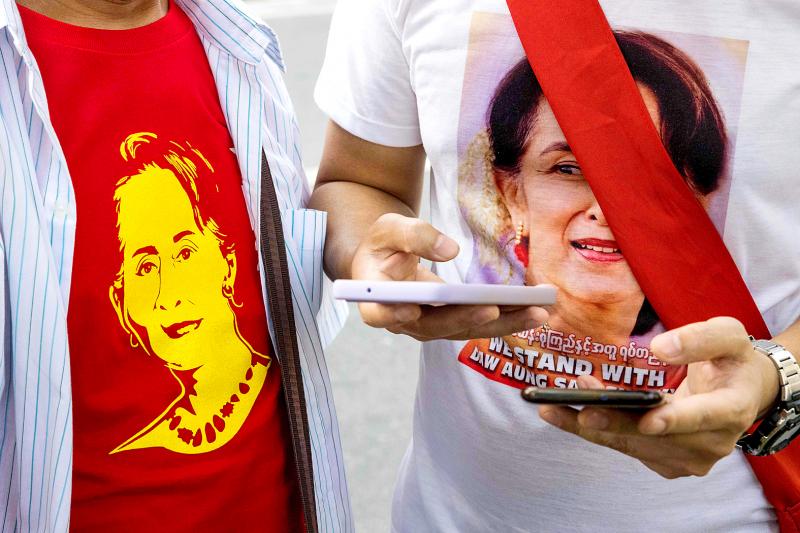The IMF last week sent US$350 million in cash to the Burmese government, part of a no-strings-attached emergency aid package to help it battle the COVID-19 pandemic.
Days later, Burmese military leaders seized power and detained Burmese State Counsellor Aung San Suu Kyi and other elected officials, in what the US Department of State on Tuesday said constituted a coup.
There appears to be little the IMF can do to claw back the funds, part of rapid-disbursing COVID-19 financing programs with almost no conditions and approved by the IMF board on Jan. 13, sources familiar with the payments and international finance experts said.

Photo: AFP
“We are following the unfolding developments closely. We are deeply concerned about the impact of events on the economy and on the people of Myanmar,” an IMF spokesperson said in a statement on Tuesday, confirming that the payment was completed last week.
US President Joe Biden, facing his first international crisis since taking office less than two weeks ago, has threatened new sanctions against the Burmese generals, and the state department said that it would review its foreign assistance to the Southeast Asian country.
The US is the dominant shareholder in the IMF, which has provided Myanmar with US$700 million in emergency COVID-19 financing over the past seven months, including last week’s payment, which included US$116.6 million through the IMF’s Rapid Credit Facility and US$233.4 million through the Rapid Financing Instrument.
The IMF on Jan. 13 said in a statement that the money would help Myanmar meet “urgent balance-of-payments needs arising from the COVID-19 pandemic, especially the government’s recovery measures to ensure macroeconomic and financial stability while supporting affected sectors and vulnerable groups.”
Unlike the IMF’s regular financing programs, which disburse funds in smaller increments as performance benchmarks are met for agreed policy reforms, COVID-19 emergency aid has been sent quickly, often all at once.
“It’s not a program that was negotiated, there isn’t conditionality and there aren’t forward-looking reviews with disbursements tied to those reviews,” said Stephanie Segal, a former IMF economist and US Treasury official who works with the Center for Strategic and International Studies in Washington.
“I’m not aware of any precedent where money that’s been approved by the IMF board can be recalled,” Segal added.
The IMF has since the beginning of the COVID-19 crisis provided emergency financing to 80 countries.
The timing of the latest payment to Myanmar was unfortunate, two sources familiar with the disbursement said, pointing to the risks of using rapid financing that gives governments broad discretion over how they spend the money.
The best-case scenario is that a Burmese administration that emerges from the current political turmoil would spend the money appropriately because it wants to have a productive relationship with the IMF, one of the sources said.
The sources expressed hope that the Central Bank of Myanmar can maintain its independence from the Burmese Ministry of Planning, Finance and Industry.
However, on Tuesday, the military appointed Than Nyein as the new central bank governor, reinstating him to a post he held from 2007 to 2013, during the rule of the last junta.
The World Bank, which has provided more than US$150 million in financing to Myanmar since the pandemic started, said on Monday that it was gravely concerned about the military takeover, warning that it risked a major setback to the country’s transition and its development prospects.

Incumbent Ecuadoran President Daniel Noboa on Sunday claimed a runaway victory in the nation’s presidential election, after voters endorsed the young leader’s “iron fist” approach to rampant cartel violence. With more than 90 percent of the votes counted, the National Election Council said Noboa had an unassailable 12-point lead over his leftist rival Luisa Gonzalez. Official results showed Noboa with 56 percent of the vote, against Gonzalez’s 44 percent — a far bigger winning margin than expected after a virtual tie in the first round. Speaking to jubilant supporters in his hometown of Olon, the 37-year-old president claimed a “historic victory.” “A huge hug

Two Belgian teenagers on Tuesday were charged with wildlife piracy after they were found with thousands of ants packed in test tubes in what Kenyan authorities said was part of a trend in trafficking smaller and lesser-known species. Lornoy David and Seppe Lodewijckx, two 19-year-olds who were arrested on April 5 with 5,000 ants at a guest house, appeared distraught during their appearance before a magistrate in Nairobi and were comforted in the courtroom by relatives. They told the magistrate that they were collecting the ants for fun and did not know that it was illegal. In a separate criminal case, Kenyan Dennis

A judge in Bangladesh issued an arrest warrant for the British member of parliament and former British economic secretary to the treasury Tulip Siddiq, who is a niece of former Bangladeshi prime minister Sheikh Hasina, who was ousted in August last year in a mass uprising that ended her 15-year rule. The Bangladeshi Anti-Corruption Commission has been investigating allegations against Siddiq that she and her family members, including Hasina, illegally received land in a state-owned township project near Dhaka, the capital. Senior Special Judge of Dhaka Metropolitan Zakir Hossain passed the order on Sunday, after considering charges in three separate cases filed

APPORTIONING BLAME: The US president said that there were ‘millions of people dead because of three people’ — Vladimir Putin, Joe Biden and Volodymyr Zelenskiy US President Donald Trump on Monday resumed his attempts to blame Ukrainian President Volodymyr Zelenskiy for Russia’s invasion, falsely accusing him of responsibility for “millions” of deaths. Trump — who had a blazing public row in the Oval Office with Zelenskiy six weeks ago — said the Ukranian shared the blame with Russian President Vladimir Putin, who ordered the February 2022 invasion, and then-US president Joe Biden. Trump told reporters that there were “millions of people dead because of three people.” “Let’s say Putin No. 1, but let’s say Biden, who had no idea what the hell he was doing, No. 2, and